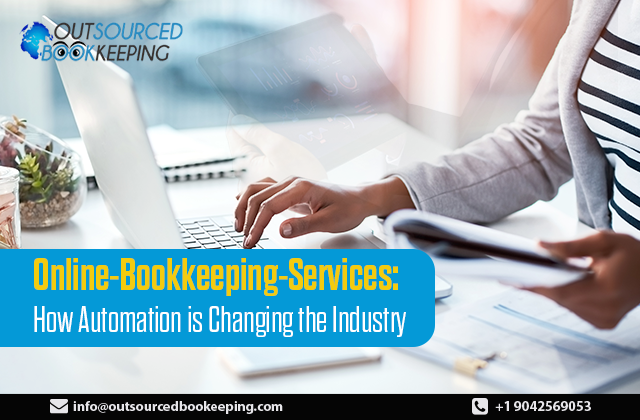Many business operations have been transformed through automation in the fast-paced digital environment, where bookkeeping practices also experience significant changes. The bookkeeping industry used to rely on lengthy data entry procedures and paper-based documentation. However, it is now undergoing quick digital transformation and automation. Businesses now use online bookkeeping services to handle their financial records with enhanced efficiency, security, and accuracy. Automation acts as a complete transformation of the entire bookkeeping practice.

The Shift to Digital Bookkeeping
Traditional bookkeeping required manual work through ledger systems and spreadsheets, together with paper receipts. The system provided functionality during past decades, yet it operated at a slow pace and contained human errors while requiring substantial human labour. The development of technology led companies to implement cloud-based accounting systems, which provided instant data updates and backup functions in addition to device-independent access.
Artificial intelligence, together with machine learning, has transformed these systems to automate transaction classification, bank statement reconciliation, and report generation while minimising human supervision. The implementation of this technological shift has dramatically minimised the workload of repetitive tasks, so businesses can focus on developing their strategies and expanding their operations.
How Automation Enhances Bookkeeping
Bookkeeping automation delivers multiple advantages, which strengthen both precision and operational speed. Accounting software establishes a direct financial connection with banks through bank feeds. Automatic transaction recording occurs frequently in real-time without requiring extensive manual entry.
Automated invoicing systems, together with payment tracking systems, improve the management of cash flow. The system allows businesses to schedule recurring invoices and get payment alerts while monitoring accounts that are past due. The system accelerates payment processing while minimising both human mistakes and payment failures.
The tracking of expenses stands as a primary area that needs improvement. Mobile applications enable receipt scanning, while automatic expense categorization takes place immediately after scanning. The platforms utilise machine learning to forecast expense categorization, which enhances their bookkeeping abilities through time.
A Game-Changer for Small Businesses
Bookkeeping services for small businesses have created equal opportunities between large and small companies. Before professional bookkeeping services became available, most small businesses did not have enough funds to either hire dedicated bookkeepers or buy sophisticated financial management software.
Modern automation technology allows businesses to obtain budget-friendly, reliable services, which maintain high standards of quality.
Small businesses achieve multiple advantages from bookkeeping tools, which include automatic tax computation as well as real-time performance tracking and simple connections to point-of-sale systems or e-commerce platforms. Business owners gain full visibility into their financial situation through automated systems to make better decisions.
The automation process protects small business owners from tax-related mistakes by maintaining compliance standards, even though they lack expert tax knowledge. Business owners can dedicate themselves to growing their businesses because they no longer need to worry about their accounting records.
Outsourcing and Automation – The Perfect Combination
The implementation of automation technologies enhances domestic and international outsourced bookkeeping services USA. The integration of automation systems with expert oversight allows outsourcing firms to provide their clients with speedy and precise services at a larger operational scale.
A combination of automated systems and skilled human experts allows the company to handle basic operations through software, but still benefit from expert interpretation of data and guidance for complex matters.
Many organisations decrease operational expenses and strengthen data protection when they outsource their bookkeeping operations to providers who use automation tools. The cloud-based infrastructure of these services provides encryption and backup functions, together with secure access limited to authorised personnel.
The process of outsourcing requires no need to hire or train internal staff, which provides businesses with a convenient and cost-efficient solution.
The system enables companies to handle growth or seasonal shifts through service expansion without needing internal organisational changes.
The Role of Human Oversight
The many benefits of automation do not eliminate the requirement for human involvement in business operations. Bookkeeping serves the essential purpose of revealing the financial narrative of any business.
The automated data management system requires human experts to analyse financial reports and detect patterns for providing strategic business recommendations.
Bookkeeping professionals organise financial data to become meaningful while maintaining absolute accuracy. Financial experts supply vital information, which software programs cannot deliver, including budgeting recommendations and forecasting capabilities as well as financial anomaly detection.
The implementation of automation technologies serves to strengthen human involvement instead of eliminating it from financial management operations.
Challenges and Considerations
Bookkeeping automation presents multiple difficulties to businesses when they transition to new technological approaches. The protection of data privacy, together with cybersecurity operations, constitutes the primary concern. Organisations need to select platforms that maintain high-security standards and train their teams to practise digital safety protocols.
The adoption of new bookkeeping tools requires staff members to overcome initial difficulties in using them. Automated systems require business personnel to learn new platforms, but most platforms offer straightforward interfaces. A business needs to select its software and service provider carefully to achieve lasting success.
Automated bookkeeping brings more advantages to businesses than its limitations. Businesses that implement the correct approach will obtain faster reporting capabilities, together with enhanced compliance and better decision-making abilities.
The Future of Bookkeeping
Bookkeeping will advance further toward automated processes in the future. The future of technology will deliver learning software, which uses data analysis to predict trends while delivering real-time information without human intervention. Bookkeeping tools will integrate three essential features: voice commands, AI-driven chatbots, and predictive analytics systems.
Organisations that adopt automation solutions now will develop operational capabilities, which will lead them to better decision-making in the future. The financial management sector now operates through online bookkeeping services and cloud-based platforms, as well as partnerships with outsourced experts because of automation’s new standards.
Bookkeeping has entered a revolutionary phase because automation represents more than a passing trend. Businesses achieve maximum accuracy, efficiency, and growth potential through technology adoption accompanied by human expertise.








